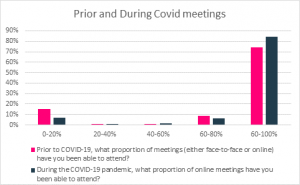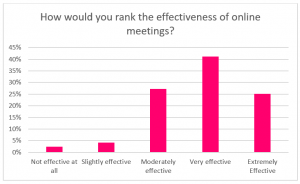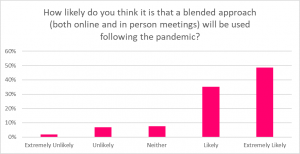Over the last year, remote working has become the norm, and this has affected governing boards too. In a blog we wrote at the height of the pandemic, we explored whether increased remote working will affect the future of school governance.
One of the key questions we asked was whether school governance will evolve gradually towards a more flexible future where online meetings become the norm.
In a recent survey we carried out with Nottingham Trent University, we asked governors we have placed in the last five years about:
- meeting attendance prior to and during COVID-19
- the effectiveness of online meetings
- the chances of a blended approached being used in the future
The responses gave us some insight about whether online meetings could replace face to face meetings as the default option. We asked governors what proportion of meetings they attended, both prior to and during the pandemic.
The responses told us that more people had been able to attend meetings since they’d moved to being held online.

The majority of our governors stated they attended around 80-100% of their meetings prior to the pandemic. However, as remote working – and remote governing meetings – became the norm, we can see an increase in governor attendance. Contrary to what some thought would be the case, the responses show that online meetings, rather than face-to-face meetings, helped to boost attendance.
But how effective are online meetings?
Improved attendance is one thing, remote meetings need to be effective to be worthwhile. We asked the same governors to rank the effectiveness of online meetings and the results are shown below.

We were pleased to see that the majority of governors have found online meetings very effective, while a large proportion have also found them ‘extremely effective’. Very few said they had found online meetings ineffective.
So – as we return to normality, what will the future of school governance look like?
We asked governors whether, going forward, they will go back to their traditional model – or whether a blended approach of online attendance and face-to-face meetings will be used instead.

Most of our governors think that in the future, their boards will use a blended approach of both online and face to face meetings. Schools have had the chance to see how online meetings work and have benefitted from improved attendance. Since schools have reopened to all pupils, they’ve been able to integrate both online and face to face meetings into their model.
Before the pandemic, we trialled ‘flexi-governance’ as a way of supporting boards to introduce a mixture of face-to-face and online meetings. By doing so, boards could benefit from governors outside of the school’s local area, joining meetings remotely.
Initially, some boards were resistant to online meetings, lacking the technological capabilities or expertise to set up effective arrangements. However, from these results, we can see that governing boards have found online meetings over the last year an overwhelmingly positive and workable solution.
The positive response has shown us that schools that may have been hesitant to try flexi-governance before may now be more open to the idea. Almost all boards will now have had the chance to hold online meetings. Adopting a more flexible approach can promote diversity on boards, and also affect the effectiveness and efficiency of the board as a whole.
Over the coming months, we’ll be working with schools and volunteers to encourage a blended approach going forward. As the survey results show, there are benefits to doing so, from improved effectiveness and attendance, to more diversity.
Learn more at the GfS Conference 2021
Interested in finding out how you board can support a blended approach to meetings?
Register for our sessions at the conference:
Leveraging technology in schools and governance – Monday 20th September, 8am.
Remote governance and your board – Friday 24th September, 8am